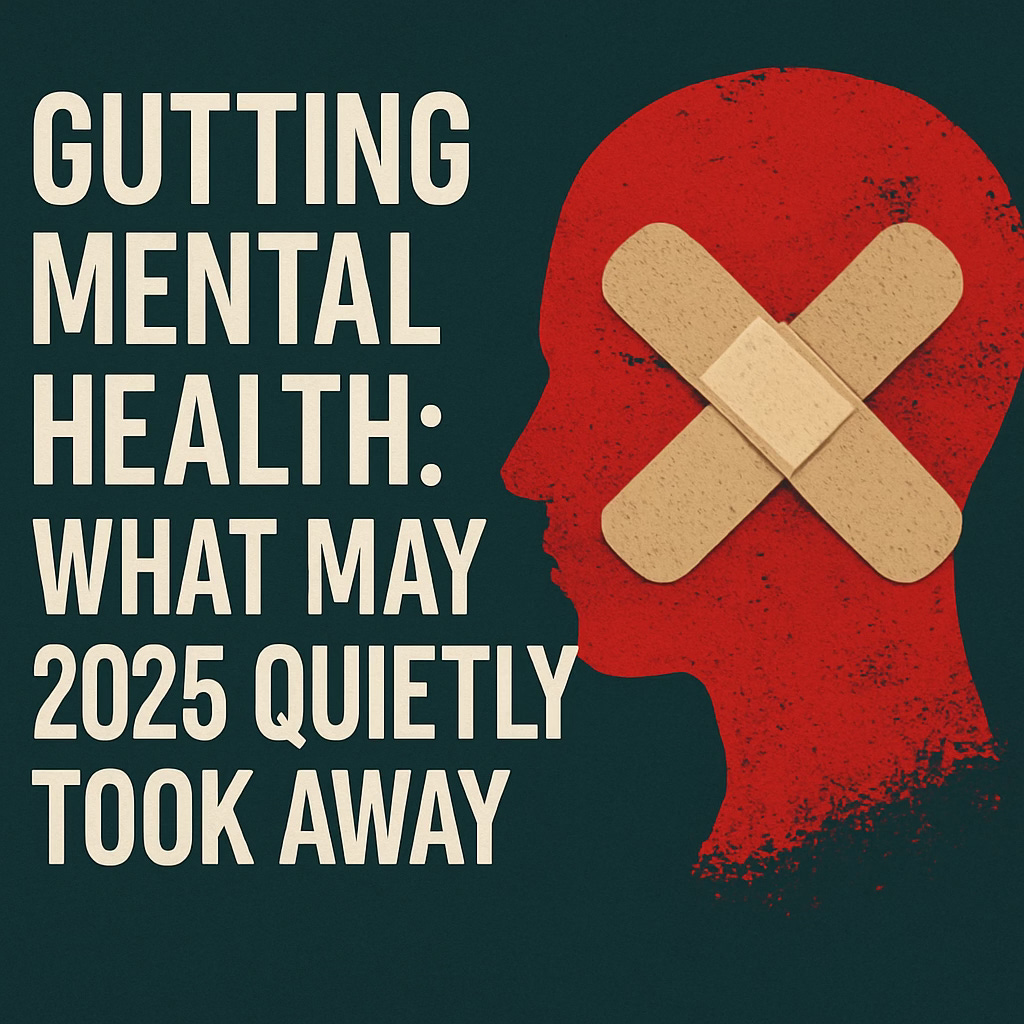Gutting Mental Health: What May 2025 Quietly Took Away
From the series First They Came for the Calendar
Return to “First They Came for the Calendar” series hub
Mental Health Awareness Month should bring light, access, and care. This year, it brought silence, cuts, and retreat.
Mental health has become one of the most urgent public health issues of our time.
From schools to crisis centers to hospitals, the need is clear. The demand is high. The human stakes are life or death.
May is Mental Health Awareness Month—a time when we’re supposed to shine a light on those needs, destigmatize support, and invest in saving lives.
But in 2025, that light dimmed.
Instead of expansion, we saw withdrawal.
Instead of care, we saw cruelty by omission.
This time, the administration didn’t make a spectacle.
They made a spreadsheet.
But the numbers told the same story as every other month this year:
What should have been celebrated was attacked.
What Happened (so far) in May 2025
$1 Billion in School Mental Health Support Was Marked for Elimination
Federal funding that had allowed schools across the country to hire mental health professionals—including counselors, social workers, and psychologists—was put on the chopping block.
These funds had been essential to building school-based mental health infrastructure, especially in underserved districts.
The administration claimed the money was “inefficient” and “too tied to woke ideology.”
But behind the rhetoric was a simple truth: schools will now be forced to choose between safety and silence.
Source: NPR →
Medicaid Reimbursements for Mental Health Units Were Threatened
Buried in the administration’s proposed budget was a major change to Medicaid reimbursement structures that many hospitals rely on to keep mental health units open.
Without these funds, hundreds of inpatient and emergency care units for mental health may close—especially in rural and low-income areas.
These closures wouldn’t be dramatic. They’d be quiet.
And people in crisis would simply have nowhere to go.
Source: Reuters →
LGBTQ+ Youth Services Under 988 Were Targeted
One of the most targeted components of the 988 Suicide & Crisis Lifeline was its specialized services for LGBTQ+ youth, operated by trained peer responders.
The administration proposed removing funding for this arm of the service—despite clear evidence it saves lives.
Senators and LGBTQ+ advocates sounded the alarm, but the budget language remained unchanged.
Source: Axios →
Federal Funding for Narcan Distribution Was Slated for Elimination
The administration’s proposed budget also included the removal of federal funding for free public access to naloxone (Narcan)—a life-saving medication that reverses opioid overdoses.
This move comes despite record-high overdose deaths and widespread bipartisan support for Narcan as a core tool in the fight against addiction and suicide. Advocates have long emphasized that addiction is often tied to untreated trauma, depression, and emotional pain—making Narcan not just a tool of physical survival, but a gateway to mental health recovery.
Without widespread access, especially in schools, libraries, transit systems, and community clinics, more lives will be lost before they can be stabilized or supported.
[Source: Multiple reporting, including Politico, NPR, and healthcare watchdogs]
What the THX Frameworks Reveal
12 Utilities Dismantled
The 12 Utilities measure whether an experience is useful, functional, and fair. In May we lost:
Access – Mental health care in schools and hospitals will be harder to reach
Security – Vulnerable youth and adults will lose critical lifelines
Resource – Programs that offered cost-effective, preventive care were slashed. Narcan saves lives in seconds, especially for the most marginalized. Cutting it reduces one of the most direct forms of public value
Emotion Evoked – What should have generated relief and gratitude instead generated fear, confusion, and betrayal
PERMAH Disrupted
Health & Wellbeing – Programs that support mental stability and prevent suicide were defunded. Removing overdose prevention tools directly undermines the chance to stabilize individuals suffering from trauma, addiction, and mental illness
Meaning – Mental Health Awareness Month was stripped of sincerity when cuts contradicted every campaign
Relationship – Trust between government and communities in crisis—especially LGBTQ+ youth—was fractured
Admiration Equation Undone
The mental health workers who show up every day in schools, clinics, and call centers deserve our admiration.
Harm reduction is an act of goodness, often delivered quietly by first responders and community volunteers. Defunding this strips away one of the most tangible expressions of care.
The institutions that fund and support them deserve our gratitude.
But admiration requires sustained support.
Not budget lines slashed in the dark.
Not lifelines quietly decommissioned.
This May, institutional goodness was replaced with political gamesmanship.
And the admiration we should have felt turned into grief and disbelief.
Prospect Theory in Action
When you give people hope—then pull it away—it does more damage than if you’d never offered support at all.
This is Prospect Theory at work:
The emotional pain of losing care during a month meant to amplify it is sharper than the pain of ongoing neglect.
The betrayal runs deeper.
And the consequences echo louder.
A Note on Timing
As of this writing—May 10, 2025—the month is far from over.
What we’ve shared here reflects actions already announced or proposed within the first 10 days of Mental Health Awareness Month.
And that’s what makes this moment so alarming:
If this much damage can be done before the midpoint of the month, what else is coming?
We will continue monitoring and updating this story as events unfold—because if the pattern holds, the most significant losses may still be ahead.
Call It What It Is
This wasn’t about fiscal responsibility.
It was a value statement—quietly issued through spreadsheets and budget drafts.
It told youth in crisis: “We’re not here.”
It told schools and hospitals: “Do more with less.”
It told the rest of us: “Mental health only matters when it’s politically convenient.”
But the people on the ground—those grieving, supporting, surviving—deserve better.
🔜 Next: What’s Likely Coming (June - December 2025)
The pattern is in motion, but this time we’re watching early. Awareness is no longer enough—preparation is the only defense.




